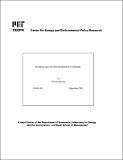| dc.contributor.author | Manzano, Osmel | en_US |
| dc.contributor.other | Massachusetts Institute of Technology. Center for Energy and Environmental Policy Research. | en_US |
| dc.date.accessioned | 2009-04-03T17:04:32Z | |
| dc.date.available | 2009-04-03T17:04:32Z | |
| dc.date.issued | 2000 | en_US |
| dc.identifier | 2000-006 | en_US |
| dc.identifier.uri | http://hdl.handle.net/1721.1/44970 | |
| dc.description.abstract | Important reforms have been made to the oil sector tax code in Venezuela. Given its diversity of oil resources, there was a concern that some resources were not being exploited because of the structure of the tax code. This paper uses traditional theoretical models to review these reforms. Then, a panel of 821 Venezuelan oil fields was used to estimate the effects of the reforms. The major conclusion reached is that reforms based on the development of marginal fields -fields that will not produce because of the tax structure- may overlook the distortions generated by the tax system in non-marginal fields,distortions that can be greater than is the case in marginal fields. | en_US |
| dc.description.sponsorship | Supported by the MIT Center for Energy and Environmental Policy Research. | en_US |
| dc.format.extent | 62 p | en_US |
| dc.publisher | MIT Center for Energy and Environmental Policy Research | en_US |
| dc.relation.ispartofseries | MIT-CEEPR (Series) ; 00-006WP. | en_US |
| dc.title | Tax effects upon oil field development in Venezuela | en_US |
| dc.type | Working Paper | en_US |
| dc.identifier.oclc | 52316780 | en_US |
